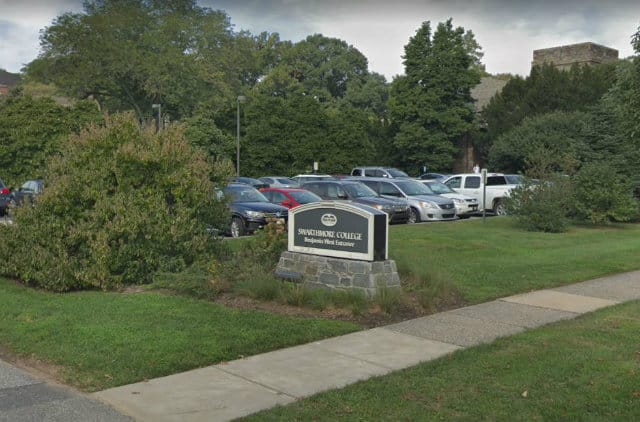
Students at Swarthmore College continued their sit-in at a campus fraternity house on Tuesday. The protests began on Saturday following the leak of 116 pages of documents from the Phi Kappa Psi fraternity. These documents include descriptions of sexual encounters, references to a “rape tunnel” and “rape attic”, and conversations about minority groups, the LGJAQ community, women, and sexual assault.
On Monday, Swarthmore President Valerie Smith released a statement, writing that “What is contained within those pages is vulgar and deeply offensive to all of us. The racism, misogyny, and homophobia described within is antithetical to the values of the College and violates the student code of conduct as well as basic decency.”
In early April, a Tumblr blog called “Why Swarthmore’s Fraternities Must Go” was started. As of Tuesday, that page has over 100 anonymous submissions from people who say they were assaulted at fraternity events or by frat members of both Phi Kappa Psi and Delta Upsilon between 2015 and 2019. The documents were released shortly after this blog was first published.
The released documents are from between 2010 and 2016. On April 17, the fraternity released a statement condemning the language used in the documents. Phi Kappa Psi is an independent fraternity and not affiliated with the nationwide organization of the same name.
The sit-in began with 50 students on Saturday and soon grew to over 100. Shortly after it began, Smith announced the suspension of all frat activities and that administrators were working with an external investigator to analyze unredacted copies of the documents.
Late Monday night, roughly 30 students remained inside the frat house. Students are demanding that both frat houses be shut down and that the college end its housing leases with the fraternities.

Attorney contributor Guy D'Andrea represents survivors of sexual violence, helping them find justice through lawsuits. Brian has offered to share some thoughts on the legal options available to those who have been sexually assaulted on college campuses:
Sexual assault on college campuses has been a widespread problem in the U.S. for decades. One study by the Centers for Disease Control (CDC) estimates that about 1 in 5 female college students have been the victims of sexual assault or attempted sexual assault since they began attending college.
Our colleges and universities have a responsibility to do all in their power to protect their students from sexual violence and harassment. But unfortunately, not all schools do their part. A federal law called Title IX prohibits any form of sexual discrimination in educational programs and activities that receive federal funding, and this law covers cases of sexual assault. When a school fails to adequately protect their students from sexual discrimination, harassment, or violence, they can be held liable under Title IX.
For example, a college might be considered liable for ignoring reports of sexual assault at a fraternity house and allowing the frat to continue operating without being investigated. Another common example is a university attempting to cover up assaults by student-athletes or coaches.
In many cases of sexual assault on college campuses, survivors have grounds for a lawsuit against their assaulter and the university for Title IX violations. Taking legal action in civil court can often provide justice for victims and these cases are often easier to win than criminal cases.
If you’re a survivor of college campus sexual assault and are looking for justice, you can learn more about your legal options by speaking with an experienced college sexual abuse lawyer.
 info@legalherald.com
info@legalherald.com